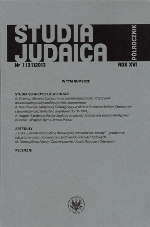Sarajewscy Sefardyjczycy w okresie Królestwa Serbów, Chorwatów i Słoweńców oraz Królestwa Jugosławii (1918–1941)
Sephardi Jews in Sarajevo during the Period of the Kingdom of Serbs, Croats and Slovenes and the Kingdom of Yugoslavia (1918–1941)
Author(s): Aleksandra Nacewicz- TwardowskaSubject(s): Jewish studies
Published by: Wydawnictwa Uniwersytetu Warszawskiego
Keywords: Sefardyjczycy; Jews in Sarajewo; Żydzi w Jugosławii
Summary/Abstract: The paper offers a general outline of the situation of Sephardi Jews who lived in Sarajevo between World War I and World Word II with a special focus on social and cultural issues. The period between the world wars is described from the perspective of the quality of local Sephardic life: its intensive cultural, social and political activities. On the one hand, it meant closer contacts with the Gentile community and, in many cases, even assimilation; on the other hand, an interest in general Jewish matters (i.e. the Zionist movement, the cooperation and contacts with Ashkenazi Jews), as well as in Sephardi matters as such (i.e. the struggle for the maintenance of Judeo-Spanish language and Sephardic culture). The article illustrates the situation of the Sephardic group at that time by the examples of robust Jewish institutions and organisations like La Benevolencija, La Lira, Matatja, as well as some Zionist groups. Much attention is also given to the local Jewish journals Jevrejski život and Jevrejski glas and their role in the so-called Sarajevan conflict, along with Sephardic and Zionist movements. The description is supplemented with observations on the local Sephardic intelligentsia and the presentation of the profiles and activities of the writers Laura Papo Bohoreta and Isak Samokovlija, as well as the linguist and essayist Kalmi Baruh.
Journal: Studia Judaica
- Issue Year: 16/2013
- Issue No: 31
- Page Range: 35-61
- Page Count: 27
- Language: Polish

